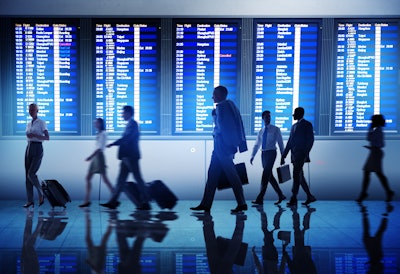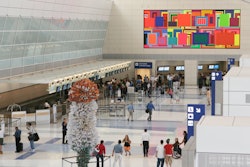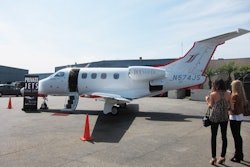
At a recent event, Valerie Bihet’s attendees had been up since 3 a.m. The group had been flying from Seattle to Miami when they ran into a variety of travel issues—leaving them tired, hungry, and frustrated when they finally arrived.
“There is nothing we can do about a delayed flight. That is out of our hands,” acknowledges Bihet, the owner of VIBE Agency. “But ensuring they are greeted warmly and their travel frustrations are acknowledged and understood is something we can do.”
In this case, Bihet set up a welcoming committee to greet the group with a drink and a cool towel. “We gave them a more VIP experience to make up for their difficult travel and get them in a happier mood going into the event,” she remembers. “If you have a bit of budget, you can also drop something in their room as a surprise upon arrival.”
Bihet also suggests acknowledging the delayed arrivals at any opening gatherings. “Welcome your guests, and during announcements, mention that people had rough travel trying to get here but you are so glad they did,” she says. “Acknowledgement goes a long way to remind them they came for a good reason.”
We’ve all experienced travel woes, particularly when it comes to airline travel. In fact, data from the Bureau of Transportation Statistics shows that 20.8% of flights have been delayed so far in 2023, compared to 18.8% in 2019. But when speakers, exhibitors, or attendees experience delays, it can quickly shift the mood of your event—or even disrupt your programming plans.
The key? As with most things events, the answer lies in very careful preparation. “Never treat travel as an afterthought, since so many variables can pop up,” advises Priscilla Nakane, senior vice president of sales and brand strategy for The V Agency. We asked Bihet, Nakane, and other top event professionals to share more travel-related tips.
1. Think about travel options before booking your venue.
"Be mindful of the travel options guests have to get to your venue," suggests Casey Pennella, manager of field marketing, North America, for Contentsquare. "Is the closest airport a major hub or are there only connecting flights? How often are there flights into your event city? Are there public transportation options for local guests?"
2. Encourage guests and speakers to arrive early.
When possible, encourage attendees—particularly speakers—to arrive a day early. “More and more people are working virtually, so if the speaker wants to arrive a day or two earlier, it's much easier to just get one more night of hotel than worry about delayed flights and changes," says Bihet.
If you're working with hotels, see if you can add a day to any room blocks. “I like to suggest to my clients that they offer shoulder dates for arrivals and negotiate the group rate for those shoulder dates as well—that way people can feel comfortable arriving a day early if schedules allow," says Kelley Pittman, a senior meeting and event planner for CWT Meetings & Events. “I would love to say I always bring in speakers a day early, but this rarely happens as speakers are often coming from another event on the 'fly.'"
3. Offer incentives for early arrivals.
For those who are able to arrive early, try to make it worth their while. “Schedule a welcome reception and share the start time with attendees to encourage early arrivals," suggests Pittman, who also likes offering a raffle to, say, the first 50 people to register and pick up their name badges.
It can also be a good idea to pad your event start times, she notes. “I will sometimes 'pad' the start times for agendas—asking people to expect to start 30 minutes to one hour earlier than the actual agenda start time so when booking flights, they plan arrival times accordingly."
4. Offer travel resources for attendees.
Chelsey A. Dulina, manager of sales and business development for Spring Studios, makes a point to share local transportation links or maps directly on the event's website, and—if dealing with a room block especially—encourages attendees to reach out directly to the hotel concierges with questions about the area. Dulina's other tip for planners? "If you are not from the area, ask your hotel/venue, etc., if there are any street closures expected—for example, in NYC, there are many during UN Week," she notes. Communicate that information to attendees as needed.
These communications can also be a great way to communicate things like weather, a common cause of travel delays. "Provide weather alerts to attendees via email, mobile app, or landing page to alert them of any storms so they can plan ahead and adjust travel as needed," suggests Pennella.
5. Book the first flight of the day, and think through weather patterns if you're booking connecting flights.
"Always book the first flight of the morning!" advises MK Granados, co-founder and head of marketing for Gen City Labs—echoing the No. 1 piece of advice from most event professionals we spoke to. "There may be a delay for de-icing or plowing the runway, but it leaves you the most options for rebooking and finding a plan B in the worst-case scenario."
And encourage travelers—particularly speakers and other important attendees—to monitor where flights are coming from, adds Jessica Charles, vice president of programming and events at Forbes. "I look at where the flight is coming from to see if there are any delays. It literally has saved me multiple times when I realize the flight I am supposed to be on is still in Europe at the gate."
And while direct flights are always ideal, if you need to consider a connecting flight, be sure to take weather patterns into account. "We usually avoid [Chicago's] O'Hare during winter months, Dallas in the rainy months, etc.," says Nicole Bernardi, executive producer for Innovative Entertainment. "Even when traveling from Southern California to Northern California, we generally fly people into Oakland to avoid any fog delays with SFO."
6. Arrange ground transportation in advance.
If there's room in the budget, it can be helpful to arrange ground transportation for guests—particularly for speakers and VIPs. For attendees, “I arrange for Lyft or Uber vouchers so they only have to use a code when booking and paying for their ride-share to and from the airport/hotel/event venue," explains Pittman. "I will arrange for group transfers for a larger group to and from the airport/event venue, and share the shuttle transfer times with the group pre-event so they know they have to arrive by a certain time in order to catch the 'free' transfers to the event venue. This encourages attendees to book flight arrival times accordingly!"
7. Assign a staffer to stay in touch with VIPs.
If a certain speaker or other guest is crucial to the success of your event, ensure someone is keeping track of them at all times—and provide them with all the information they need in advance. “Make sure to have a travel itinerary for the guest/traveler with all pertinent details: flight info, alternative ground transport info, weather at arrival city, contact numbers, etc.," says Nakane. "And make sure to have a greeter/handler waiting at the venue drop-off to escort the speaker directly to the green room.”
Because, after all, “If someone gets delayed but you get a heads up in enough time, you might be able to edit the schedule,” points out Carrie Holmes, group sales manager at Virginia's The Founders Inn and Spa, Tapestry Collection by Hilton. (Holmes’ other crucial tip? “In addition to a thumb drive, [have speakers] email or Dropbox a copy of their presentation/materials." That way things can be set up even if their arrival is delayed.)
8. Prioritize flying important staffers in early.
If budget or other obligations prevent the entire team from flying in early, "Make sure core team members are on site at least one day pre-event," advises Pennella. "This gives you a buffer for any travel delays and also ensures the team is well prepared if your event starts early the next day. This is also a great opportunity to host VIP welcome events before the show officially kicks off to get some extra face time with those who matter most."
9. Always have a backup plan for speakers.
Sometimes, despite your best efforts, travel issues might prevent some guests from attending at all. For speakers in particular, Bihet says, "have a backup plan for them to present virtually and livestream it into the event during their designated time. I always have a virtual option ready to go."
Related: 6 Tips for Replacing a Keynote Speaker at the Last Minute



















